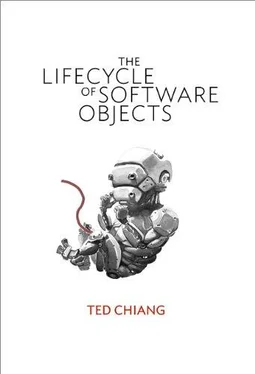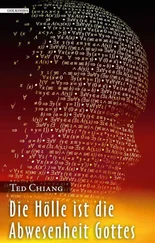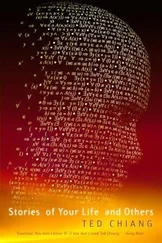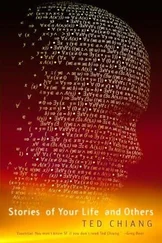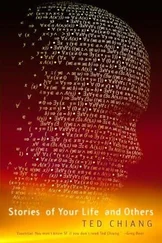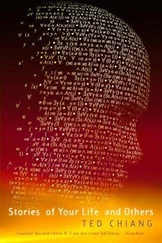Ana laughs too, and says, “Keep watching.”
On the screen she says, “It doesn’t matter how hard I try, Marco; the outside world doesn’t have portals. Only Data Earth has portals.”
“Then we go Data Earth, open portal there.”
“That would work for you if there’s a body there for you to wear, but I can’t wear a different body, I’d have to move this one, and that would take a long time.”
Marco thinks about that, and Derek’s delighted to see that the digient’s face actually suggests his incredulity. “Outside world dumb,” the digient announces.
Derek and Ana burst out into laughter. She closes the windows and says, “You did some terrific work there.”
“Thanks. And thanks for showing that to me; it made my day.”
“Glad to do it.”
It’s nice to be reminded that his earlier work is bearing fruit, because most of Derek’s recent assignments aren’t nearly as interesting. The Origami and Faberge digients have begun to pop up in a wider variety of avatars, such as baby dragons, gryphons, and other mythological creatures, so Blue Gamma wants to offer similar avatars for the Neuroblast digients. The new avatars are straightforward modifications of the existing ones, requiring nothing new in terms of their facial expressions.
In fact, his newest assignment requires him to create an avatar with no facial expressions at all. A group of artificial-life hobbyists was impressed by the potential of the Neuroblast genome and, rather than wait for real intelligence to evolve on its own in the biomes, commissioned Blue Gamma to design an intelligent alien species for them. The developers engineered a personality taxon that was miles away from the breeds that Blue Gamma sells, and Derek’s designing an avatar with three legs, a pair of tentacles instead of arms, and a prehensile tail. Some of the hobbyists want an even stranger body plan, as well as an environment with different physics, but he reminded them that they’ll have to wear the avatars themselves when raising the digients, and controlling tentacles will be difficult enough.
The hobbyists have named their new species Xenotherians, and set up a private continent called Data Mars on which they intend to create an alien culture from scratch. Derek’s curious about it but hasn’t been able to visit, because the only language allowed in the presence of the digients is a custom dialect of the artificial language Lojban. He wonders how long the hobbyists will be able to stick with their project. Aside from the enormous barrier to entry, raising the Xenotherians won’t offer pleasures like the one that he and Ana just got from watching Marco. The rewards will be purely intellectual, and over the long term, will that be enough?
Over the course of the following year, the forecast for Blue Gamma’s future changes from sunny to decidedly cloudy. Sales to new customers have slowed down, but worse than that, the revenue generated by the food-dispensing software has fallen: more and more of the existing customers are suspending their digients.
The problem is that as the Neuroblast digients leave infancy behind, they’re growing too demanding. In breeding them Blue Gamma aimed for a combination of smart and obedient, but with the unpredictability inherent in any genome, even a digital one, it turns out the developers missed their target. Like an overly difficult game, the balance of challenge and reward that the digients provide is tilting beyond what most people consider fun, and so they suspend them. But unlike dog owners who bought a breed they were unprepared for, Blue Gamma’s customers can’t be blamed for not having done their homework; the company itself didn’t know that the digients would evolve in this way.
Some volunteers have begun maintaining rescue shelters, accepting unwanted digients in hopes of matching them with new owners. These volunteers practice a variety of strategies; some keep the digients running without interruption, while others restore the digients from their last checkpoint every few days, to keep them from developing abandonment issues that might make it harder for them to get adopted. Neither strategy is enormously successful at attracting prospective owners. There is occasionally a person who wants to try a digient without having to raise one from infancy, but these adoptions never last for long, and the shelters essentially become digient warehouses.
Ana’s not happy about this trend, but she’s familiar with the realities of animal welfare: she knows you can’t save them all. She’d prefer to shield Blue Gamma’s mascots from what’s happening, but the phenomenon is too widespread for that to be practical. Again and again she has taken them to a playground and one of the digients realizes that a regular playmate is absent.
Today’s trip to a playground is different, and brings a pleasant surprise. Even before all the mascots are through the portal, Jax and Marco notice another digient wearing a robot avatar. They simultaneously exclaim “Tibo!” and run over to him.
Tibo is one of the oldest digients aside from the mascots, owned by a beta tester named Carlton. He suspended Tibo about a month ago; Ana’s glad to see that it wasn’t permanent. As the digients chatter, she walks her avatar over to Carlton’s and talks with him; he explains that he just needed a break, and now is feeling ready to give Tibo the attention he needs.
Later on, after she’s brought the mascots back from the playground to Blue Gamma’s island, Jax tells her about his conversation with Tibo. “Tell him about fun we do time he gone. Tell him about field trip zoo fun fun.”
“Was he sad he missed it?”
“No he instead argue. He said field trip was mall not zoo. But that trip last month.”
“That’s because Tibo was suspended the whole time he’s been gone,” Ana explains, “so he thinks last month’s trip was yesterday.”
“I say that,” says Jax, surprising her with his understanding, “but he not believe. He argue until Marco and Lolly too tell him. Then he sad.”
“Well, I’m sure there’ll be other trips to the zoo.”
“Not because missed zoo. Sad missed month.”
“Ah.”
“I not want be suspended. Not want miss month.”
Ana does her best to sound reassuring. “You don’t have to worry about that, Jax.”
“You not suspend me, right?”
“Right.”
To her relief, Jax seems satisfied by this; he hasn’t encountered the idea of extracting a promise, and she’s embarrassingly glad that she didn’t have to make him one. She takes comfort in the knowledge that if they suspend the mascots for any period of time, they’ll almost certainly suspend all of them, so at least there won’t be experiential discrepancies within the group. The same would be true if they ever roll the mascots back to a younger age. Restoring an early checkpoint is one of Blue Gamma’s suggestions for customers who find their digients too demanding, and there’s been talk that the company should do this with its own mascots to endorse the strategy.
Ana notices the time, and begins instantiating some games for the mascots to play on their own; it’s time for her to train the digients in Blue Gamma’s new product line. In the years since creating the Neuroblast genome, the developers have written more sophisticated tools for analyzing the interactions of its various genes, and they understand the genome’s properties better. Recently they’ve created a taxon with less cognitive plasticity, resulting in digients that should stabilize more quickly and stay docile forever. The only way to know for certain is to let customers raise them for years and see what happens, but the developers’ confidence is high. This is a significant departure from the company’s original goal of digients that become ever more sophisticated, but drastic situations call for drastic measures. Blue Gamma is counting on these new digients to stanch the loss of revenue, so Ana and the rest of the test team are intensively training them.
Читать дальше
